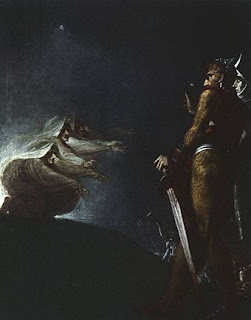BEATRICE & BENEDICK are two of the most popular characters created by my best friend, Mr. William Shakespeare in his well-loved play, Much Ado About Nothing.
Strangely enough, even though their witty word play and oral sparring take up a major part of the play, their actual contribution to the main Hero-Claudio plot is very marginal.
In fact, despite the above, it is very difficult to imagine this play without these two characters playing their witty parts.
However, despite their (almost) marginally important parts within the main plot, their verbal attacks and poniards are considered to be a major part of the play. This was so much so, that King Charles II even wrote Benedick and Beatrice next to the play's title in his own copy of the Second Folio.
One of the major aspects of the B & B male-female relationship is to act as a contrast to the more traditional one that is played out by Beatrice's cousin, Hero and her fiance, Claudio. This love affair is much more conventional in that the bridegroom assumes that his blushing bride will be as pure as the driven snow. When Claudio is led to believe that this is not so, his verbal attacks are so vicious that he causes Hero to faint away at their wedding ceremony after calling her a 'rotten orange' who 'knows the heat of a luxurious bed.'
Who says that B & B have to be very young? James Earl Jones and Vanessa Redgrave playing these parts.
John Gielguid and Peggy Ashcroft as the sparring lovers many years ago.
Beatrice and Benedick are also an example of an equal sparring of wits, i.e. the man and woman are on the same level. Their use of language may be compared to some of the verbal battles that Katherine and Petruchio have in The Taming of the Shrew.
B & B's parallel sparring is the central action in Act III when their friends cause them to believe that despite their non-stop repartee at each other's expense, they really do love one another. This can be seen very well in Kenneth Branagh's 1993 successful film adaption of this play.
In addition, Beatrice is yet another example of one of Shakespeare's strong female roles, together with Katherine, (The Taming of the Shrew), Lady Macbeth, Cleopatra and Portia in the Merchant of Venice. This is even more remarkable when one considers that when Shakespeare wrote the the lines for these major characters, they were played by young boys whose voices had not yet broken.
Next time I will write about Nick Bottom from "A Midsummer Night's Dream."
Comments will be appreciated at: wsdavidyoung@gmail.com or on my website: dly-books.weebly.come
An Elizabethan version of B & B
Strangely enough, even though their witty word play and oral sparring take up a major part of the play, their actual contribution to the main Hero-Claudio plot is very marginal.
In fact, despite the above, it is very difficult to imagine this play without these two characters playing their witty parts.
However, despite their (almost) marginally important parts within the main plot, their verbal attacks and poniards are considered to be a major part of the play. This was so much so, that King Charles II even wrote Benedick and Beatrice next to the play's title in his own copy of the Second Folio.
One of the major aspects of the B & B male-female relationship is to act as a contrast to the more traditional one that is played out by Beatrice's cousin, Hero and her fiance, Claudio. This love affair is much more conventional in that the bridegroom assumes that his blushing bride will be as pure as the driven snow. When Claudio is led to believe that this is not so, his verbal attacks are so vicious that he causes Hero to faint away at their wedding ceremony after calling her a 'rotten orange' who 'knows the heat of a luxurious bed.'
Who says that B & B have to be very young? James Earl Jones and Vanessa Redgrave playing these parts.
John Gielguid and Peggy Ashcroft as the sparring lovers many years ago.
Beatrice and Benedick are also an example of an equal sparring of wits, i.e. the man and woman are on the same level. Their use of language may be compared to some of the verbal battles that Katherine and Petruchio have in The Taming of the Shrew.
B & B's parallel sparring is the central action in Act III when their friends cause them to believe that despite their non-stop repartee at each other's expense, they really do love one another. This can be seen very well in Kenneth Branagh's 1993 successful film adaption of this play.
In addition, Beatrice is yet another example of one of Shakespeare's strong female roles, together with Katherine, (The Taming of the Shrew), Lady Macbeth, Cleopatra and Portia in the Merchant of Venice. This is even more remarkable when one considers that when Shakespeare wrote the the lines for these major characters, they were played by young boys whose voices had not yet broken.
Next time I will write about Nick Bottom from "A Midsummer Night's Dream."
Comments will be appreciated at: wsdavidyoung@gmail.com or on my website: dly-books.weebly.come
















































